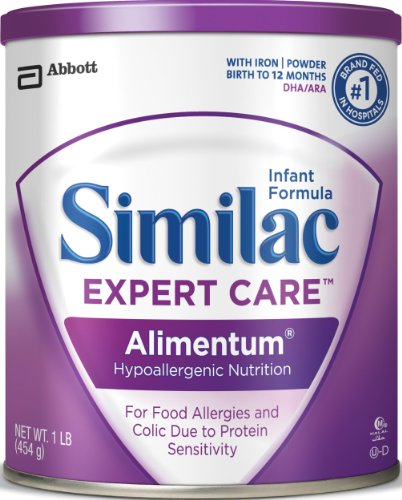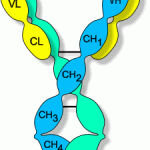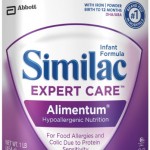Allergic colitis is a condition in infants that results from an immune response triggered by proteins in the diet. This immune response leads to a reaction in the lining of the gastrointestinal tract. Cow and soy milk proteins, as well as those in breast milk are the most common dietary proteins that cause this reaction in infants. Typically, babies with allergic colitis appear healthy and have normal, soft stools that contain flecks or streaks of blood. This small amount of bleeding does not usually cause problems; rarely babies may develop a low blood count (anemia). When other symptoms develop, such as fussiness (especially fussiness while passing stool), diarrhea, vomiting and failure to thrive, treatment is needed. The usual onset of allergic colitis is in the first 2 months of life but it also occurs in infants from 1 day to 6 months of age.
What are the types of protein hypersensitivity?
There are two types of protein hypersensitivity, IgE mediated and non-IgE mediated sensitivity. IgE is an immunoglobulin or antibody associated with allergies that produce an immediate reaction and often anaphylaxis. This may include difficulty breathing and/or skin/rash type symptoms. Infants with allergic colitis do not have anaphylaxis and symptoms occur gradually, initially on and off over several days, then progressing to streaks of blood in most of the stools. This gradual development of symptoms suggests that allergic colitis is a non-IgE mediated disorder.
Why are infants susceptible to allergic colitis?
The exact mechanisms that allergic colitis develops is not certain but there are at least 3 proposed reasons why infants may be predisposed to allergic colitis. These include
1) immature immune defense system of the intestine,
2) exposure to the large amounts of intact proteins in formulas, and
3) increased intestinal permeability often seen with prematurity, malnutrition, viral enteritis, reflux esophagitis, or other chronic intestinal inflammatory disease. When the intestine is permeable, then whole, undigested proteins can cross into the blood stream and may provoke allergy.
How is Allergic Colitis diagnosed?
In most cases your doctor will make a diagnosis of allergic colitis based on history and exam of your infant and his/her stool. Stool culture and a blood count may be performed. Rarely, a flexible sigmoidoscopy/ colonoscopy procedure is needed to evaluate the lower portion of the large intestine. Biopsies are done to identify characteristic of allergies and to exclude other causes for bleeding.
What is the treatment for Allergic Colitis?
Treatment consists of elimination of offending protein from the diet, which should lead to an improvement in bleeding. Improvement is often noted within 72 to 96 hours, although bleeding may persist for a few weeks.
“Hypoallergenic†formulas are usually recommended in babies being fed standard milk based commercial formula. Improvement may also result in some breast fed infants if the mother eliminates cow’s milk from her diet.
What formulas are recommended?
Soy formulas are sometimes tolerated but hypoallergenic formulas or protein hydrolysate formulas are the best treatment for a majority of these infants. These formulas consist of partially and extensively hydrolyzed proteins, meaning that they are broken down to more digestible proteins that do not trigger an immune response. If an adequate clinical response is not obtained after 2 weeks, a trial of an amino acid-based formula is indicated. Infants who respond to a protein hydrolysate formula should continue to be fed with this formula probably until the end of the first year of life at which time they may be challenged with whole cow’s milk. Most will tolerate a milk challenge at that time. If they do not, repeat challenges every three months may be necessary. Infants who are intolerant of protein hydrolysate formula should be continued on an amino acid-based formula.
Often this problem is confused with lactose intolerance in which an older child does not have the necessary enzymes to digest milk sugar or lactose. These children may have diarrhea as a result of lactose intolerance but they rarely have intestinal bleeding. Exclusion of lactose from the diet will not help babies with allergic colitis.
Mothers of breast fed infant may need to remove some proteins from their diet (cow’s milk, soy, egg, fish, and wheat.) A dietitian can recommend a diet appropriate for the mother. Alternatively, breast-fed infants may continue to breast feed if the condition isn’t severe. That is, the symptoms are tolerable and the infant continues to thrive and gain weight despite an occasional blood streaked stool. Some, breast-feeding infants may stop breast feeding.
|
Below is a list of formulas and their ingredients: Formula |
Protein Source |
|
Nutramigen |
Casein |
|
Pregestimil |
Casein |
|
Prosobee |
Soy |
|
Neocate |
Amino Acids |



